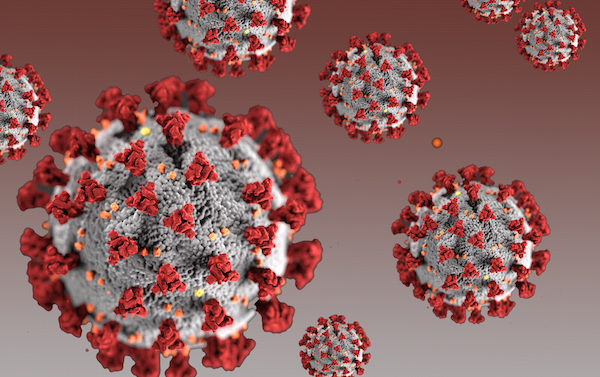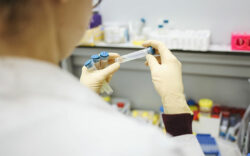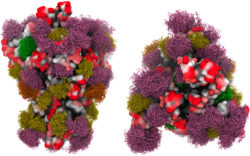The University of Georgia reported a drop in positive cases of COVID-19 for a third consecutive week on Wednesday, with 63 positive cases reported for the week of September 21-27. The positive rate for surveillance testing fell to 1.95%, with 1,490 tests administered. Positive cases, as reported through the University’s DawgCheck system, included 52 students, nine staff and two faculty members.
For the first time since UGA began its weekly data releases on COVID-19, it also released data on the positivity rate for symptomatic individuals at the University Health Center last week. For the week of Sept. 21-27, 118 tests were performed and six were positive, giving a positive rate of 5.08 percent.
While the numbers are trending in the right direction statewide, the weekly White House Task Force Coronavirus Report still lists universities as a major source of concern in Georgia despite recognition that there has been improvement across campuses statewide. That report, obtained through an open records request this week, now lists Georgia in the orange zone for cases, with 51-100 new cases per 100,000 population last week. Georgia has the 23rd highest case rate in the country. Georgia is now in the yellow zone for testing, with a 5-7.9 percent positive rate last week. That rate is the 22nd highest in the country.
Missing Data Gives Unclear Picture
While the numbers—statewide and at UGA—appear to be decreasing, neither UGA nor the Georgia Department of Public Health have released any data on rapid antigen testing results. Last week, the White House Task Force’s report recommended release of this data, as the nation shifts to more rapid antigen testing over nasal swabs. On Monday, Gov. Brian Kemp announced that Georgia will be receiving a shipment of 3 million rapid antigen tests over the next three to four months, with an initial shipment of 200,000 tests. At the beginning of the fall semester, UGA announced that they had access to 10,000 saliva tests.
However, UGA is not using saliva tests, nor antigen tests.
“The university has not deployed these [saliva] tests, but they remain available should the need arise,” said Greg Trevor, interim senior executive director for marketing and communications. “If and when they are used, the data will be reported in the proper category on the UHC website. We are not performing any antigen tests at UGA at this time. The saliva tests, as well as all other tests, are PCR/Molecular tests. Antigen testing is roughly 90% sensitive, and sensitivity is optimal when the test is done within 5-7 days of symptom onset. PCR testing is 99-100% sensitive.”
Georgia does keep records on rapid antigen results statewide, but has yet to make those results available to the public. In response to an open records request, DHP told Flagpole that it will begin reporting antigen data on its website in the next week or two.
Across the country, the lack of data on rapid antigen testing has many experts concerned that public health officials are flying blind. As Kaiser Health News reports, more than 20 states either don’t release or have incomplete data on the rapid antigen tests. The test is now considered key to containing the coronavirus in the long term, while waiting for a possible vaccine. The tests being shipped to Georgia are made by BinaxNOW and one of only four rapid antigen tests approved for emergency use by the Food and Drug Administration.
These tests can be used in the field, without the need for laboratory processing, with results in about 15 minutes. The test detects proteins on the surface of the virus and is less sensitive than PCR tests that require lab processing. Both St. Mary’s and Piedmont Athens Regional currently use PCR tests.
“So we know that there are tests flooding the market, and so the question is how are our reporting mechanisms? Do we have enough infrastructure in place to adequately put those tests into actionable use?” said Amber Schmidtke a public health microbiologist who has been monitoring the COVID-19 situation and produces a daily newsletter explaining the Georgia Department of Public Health’s pandemic data. “Yes, we’re putting them in the hands of people, but we’re not training people on how to use these, and we don’t have a reporting mechanism, or I don’t know what the reporting mechanism is to ensure that we’re reporting both positive and negatives.”
While cases continue to increase in Athens, a sign that transmission is still happening in the county, it’s hard to tell if UGA is still a major source of that transmission without release of rapid antigen data. Furthermore, UGA has not released any data on how often UGA students, faculty and staff are actually using the self-reporting app, DawgCheck, to report test results and symptoms.
In addition, it seems that the UGA students, faculty and staff are getting tested less frequently at the UGA surveillance site. While the testing location has the capacity for up to 500 tests a day, today’s news release on the Covid-19 noted that they have not been meeting that capacity.
“Once again, we are very encouraged by these results,” Garth Russo, executive director of the University Health Center and chair of UGA’s Medical Oversight Task Force, said in a news release. “However, I was disappointed to see that participation in our surveillance testing dropped after a record high last week. We can test about 500 individuals a day at Legion Field, yet we averaged only around 300 per day last week. We need strong, sustained participation in our testing program to maintain the progress we are making against this disease.”
Changes are afoot to help increase participation though, the release said. Student Affairs will be launching a campaign to increase awareness and incentivize student participation. The release did not elaborate on what those measures will include, but does note that in cases where there is same-day availability at the surveillance site at Legion Field, staff will accept walk-up appointments.
Without Antigen Data, Hospitals and Wastewater Are Key
The lack of data on rapid antigen testing also makes it very difficult to tell if the UGA community is contributing to transmission on the county level. Wednesday, Athens-Clarke County had a cumulative total of 5,084 cases and 44 deaths. That’s an increase of 49 cases since Monday.
While incomplete testing data can be problematic in showing a true picture of how things are going with the pandemic, there are other sources that can help us illuminate the conditions in Athens.
UGA’s Center for the Ecology of Infectious Diseases wastewater surveillance data can point to whether there are large outbreaks occurring in an area based on sewage water. While this data can’t pinpoint very specific areas just yet, it’s valuable to help keep an eye on the pandemic. Thursday, the CEID will release new data on Athens wastewater.
While a lagging indicator, hospitalization and death rates will also tell us if our numbers are actually increasing. Currently, hospitalizations are still about twice as high as they were prior to the summer surge.
“It’s easier to see [hospitalizations and deaths] than testing in cases, but the problem is that both of those are lagging indicators,” said Schmidtke. “So by the time we recognize that there’s a spike in either one, even if we took immediate action now, it would take two to three weeks to make a big difference. So that’s the danger in relying on those to guide policy.”
For now, Schmidtke said she’s cautiously optimistic, but several factors are at play.
“On the surface, it does look promising that things are going down, especially considering that we’re past three weeks after the Labor Day holiday. That’s a good sign, although we should remember that our best data are two weeks old,” she said. “There’s a lot of open questions [for Georgia], and in terms for the college campuses, too. In terms of, is it actually going down or is this an artifact of a shift in preference toward a particular test that isn’t being used to account cases? Really, it’s kind of a black box. We won’t know until the state starts providing the data.
“We’ve come a long way from a very high peak and we still haven’t come all the way down,” she added, “but the momentum can shift really fast.”
This post has been updated to add details about antigen testing records and UGA’s testing at the University Health Center.
Like what you just read? Support Flagpole by making a donation today. Every dollar you give helps fund our ongoing mission to provide Athens with quality, independent journalism.










